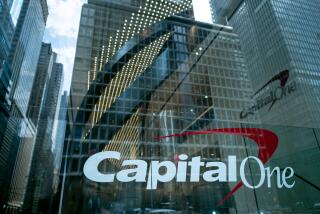Investing: Discover Financial has paid off for shareholders
Question: I am very pleased with my shares of Discover Financial Services but wonder whether the financial area is still a good place to be invested. Suggestions?
Answer: Its shareholders can concur with the advertising slogan “It pays to Discover.”
Shares of Discover Financial are up 32% this year after last year’s 26% gain. Earnings more than doubled to $642 million in its third quarter, exceeding analyst estimates as summer card use rose and higher gasoline prices boosted total volume.
Nonetheless, the economic and competitive pressures that affect its Discover credit card, debit card and Diners Club International businesses mean it can never grow complacent.
Among the positives, consumers have continued to use credit cards despite a weak economy and high unemployment. The firm’s delinquency rate for card loans over 30 days and its charge-offs for cards both declined in the third quarter.
Discover was an industry pioneer in the cash rewards concept, and the number of merchants accepting the Discover card continues to grow. The annual study by research firm Brand Keys Inc. named Discover the card industry’s leader in brand loyalty.
An investor’s decision on the company’s stock should consider whether credit card industry results can remain robust without a relapse. There is also speculation from time to time that Discover could be purchased by a large competitor.
Consensus analyst opinion on shares of Discover is “buy,” according to Thomson Reuters, consisting of six “strong buys,” five “buys” and 10 “holds.” The firm’s strong cash generation helps it cope with economic and market volatility.
It offers online savings accounts, certificates of deposit and loans through its Discover Bank subsidiary and also operates the Pulse ATM/Debit network. Its most recent acquisitions have been Citigroup’s Student Loan Corp. and Tree.com’s Home Loan Center.
In its quarterly Securities and Exchange Commission filing, the company said the Federal Deposit Insurance Corp. notified Discover Bank that the agency planned to take an enforcement action against it over marketing practices for fee-based products such as its payment protection product. A number of class-action lawsuits challenging those practices have been settled by the company. Discover said it has made changes to its fee-based program and believes current practices substantially address the FDIC concerns.
Fidelity OTC Fund has big returns
Question: Is Fidelity OTC Fund going to be able to keep up its returns?
Answer: It is a big fund providing investors with big returns.
Gavin Baker, an analyst and manager at Fidelity since 1999, has turned in remarkable results since he took over this fund in 2009. Although his goal is to beat the volatile Nasdaq composite index, he uses restraint by paying attention not only to growth prospects but also to fundamentals, stock price and momentum.
The $6.7-billion Fidelity OTC Fund is up 18% over the last 12 months and has a three-year annualized return of 22%. Both results rank in the upper 2% of the large growth fund category.
“Fidelity OTC is for investors seeking technology stocks, though it does offer more diversity than that,” said Janet Yang, mutual fund analyst with Morningstar Inc. in Chicago. “While a smaller-cap and tech bias has provided head winds for this fund, other picks were skillfully selected and also turned out to be good.”
There has been considerable manager turnover at the fund over the last decade, primarily because Fidelity has treated it like a “steppingstone” fund where managers serve a tour of duty before moving on to even larger Fidelity funds, she said. According to filings, manager Baker has between $100,000 and $500,000 of his own money invested in this fund.
“This fund is classified as a large growth fund, but it is unique in that its mandate is to invest most of its assets in either Nasdaq or OTC stocks,” Yang said. “It focuses a little more on small-cap companies than its peers.”
Software and hardware each represent about one-fifth of the fund’s portfolio, with other concentrations in telecommunications and healthcare. Largest holdings recently were Apple Inc., Google Inc., Amazon.com Inc., NVIDIA Corp., Cognizant Technology Solutions Corp., Rackspace Hosting Inc., Accretive Health Inc., Sprint Nextel Corp., Vertex Pharmaceuticals and Comcast Corp. This “no-load” (no sales charge) fund requires a $2,500 minimum initial investment and has an annual expense ratio of 0.92%.
Andrew Leckey answers questions only through the column. Write to him at yourmoney@tribune.com.
More to Read
Inside the business of entertainment
The Wide Shot brings you news, analysis and insights on everything from streaming wars to production — and what it all means for the future.
You may occasionally receive promotional content from the Los Angeles Times.










